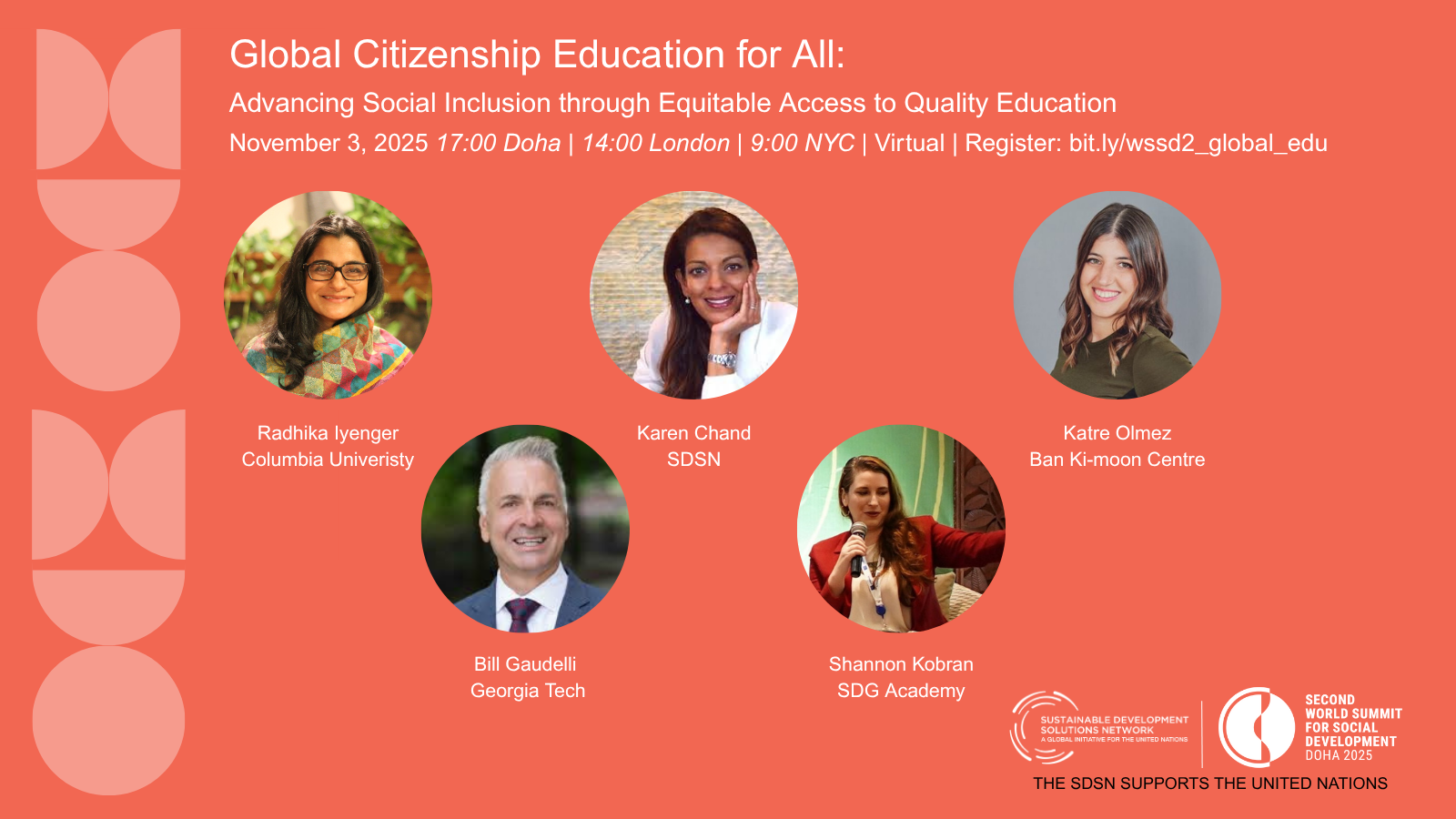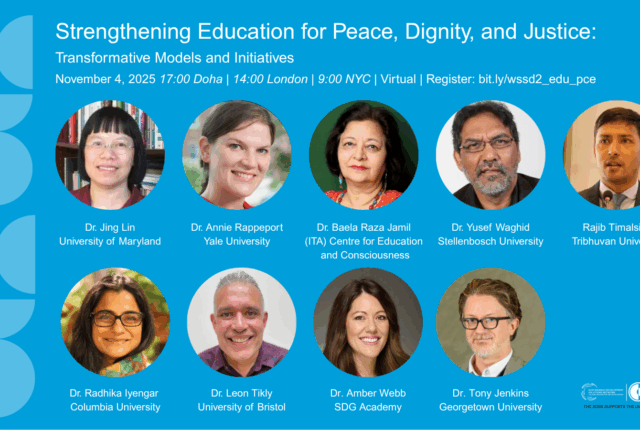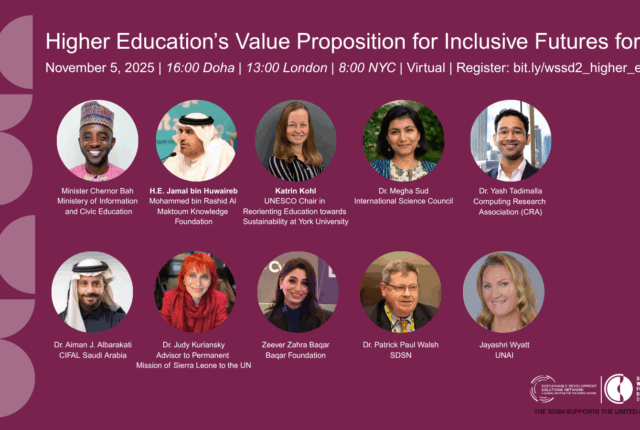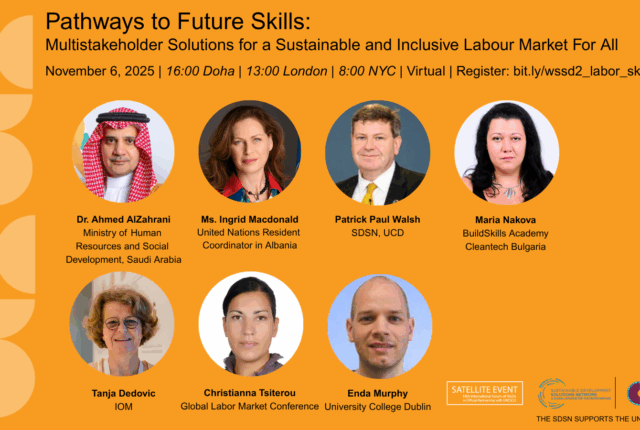A Side Event of the Second World Summit for Social Development
“Education is the foundation of social progress.“
How do we rebuild trust and belonging in a fragmented world? The answer, said UN Secretary-General António Guterres at a recent high-level side event of the Second World Summit for Social Development, starts with education.
His words echo the tone set by our own virtual Solutions Session—“Global Citizenship Education for All: Advancing Social Inclusion through Equitable Access to Quality Education”—which brought together education leaders to examine how Global Citizenship Education (GCED) can drive social inclusion.
Opening the discussion, Shannon Kobran, Head of Education and Training at the SDG Academy, emphasized that GCED fosters “empathy, critical thinking, respect for diversity, and a sense of shared responsibility for people and planet.” These, she noted, are essential competencies for building more inclusive societies.
The session then turned to how these ideals are being put into practice through two complementary initiatives: the SDSN’s Mission 4.7 Malaysia project and the Ages of Globalization curriculum—each offering lessons on how to make education systems more inclusive, equitable, and future-ready.
Mission 4.7 Malaysia: Localizing Global Citizenship Education
Karen Chand, Director of Education Studies at the SDSN, presented Mission 4.7 Malaysia, an ambitious national project to advance SDG target 4.7 on education for sustainable development.
Ms. Chand explained that despite high attendance rates, the Malaysian system faces challenges like learning poverty and alarmingly low student awareness of global issues, as measured by international assessments. This data makes the case clear: we need to transform what is taught, not just whether children are in school.
Against this backdrop, Mission 4.7 Malaysia aims to transform the education system into one that drives national, social, and economic transformation and develops a globally competitive citizenry with 21st-century competencies.
In a 2022 situation analysis, Ms. Chand’s team found that, while the Malaysian curriculum includes aspects of Education for Sustainable Development (ESD) and GCED, teachers receive little to no training in how (or why) to emphasize these themes in classrooms. Instead, many educators focus only on syllabus completion and high-stakes exams—a culture that leaves little space for fostering creativity or inclusion.
Their solution, therefore, centered on teacher professional development.
Piloting an innovative teacher training across Malaysian schools, the SDSN revealed an under-utilized reservoir of professional potential. Ms. Chand noted, “Educators demonstrated a strong willingness and capacity to engage with global citizenship education. They really understood how meaningful it was, how future-relevant it is.”
Ms. Chand emphasized that the long-term sustainability of teacher training initiatives hinges on several enabling conditions: coherent policy frameworks, leadership support, community engagement, and strong mechanisms for monitoring and evaluation. Building on these lessons, and thanks to advocacy from the SDSN, Malaysia’s upcoming Education Blueprint 2026–2035 will, for the first time, include a dedicated section on Education for Sustainable Development and Global Citizenship. The SDSN is currently preparing an action plan to help guide implementation of the ESD section.
Ages of Globalization: Storytelling for Shared Understanding
While the Malaysian experience demonstrated how policy and teacher training can localize GCED, the next presentation explored how storytelling can universalize it.
The Ages of Globalization curriculum presented by Dr. Radhika Iyengar, Director of Education at Columbia University’s Center for Sustainable Development, offers a multidisciplinary template that connects history, geography, and current events to teach the SDGs, helping students understand their place in a shared global narrative.
Framed as a journey about realizing who we are and how history has shaped us, the multimedia course, based on Professor Jeffrey Sachs’s book of the same name, invites learners to travel through UNESCO World Heritage sites across seven ages of human history, connecting global lessons to local realities.
“The learner is able to understand globally,” explained Dr. Iyengar, “because a big part of global citizenship is to understand the global picture—not just the current, but the past.”
Not a geography course, not a history course, but something more nuanced and complex, Ages of Globalization uses a systems-thinking approach to blend philosophy, economics, technology, and ethics to help learners develop empathy for themselves and those around them.
Since its launch in 2024, the Ages of Globalization program has grown into a movement: the self-paced online course currently boasts more than 4,000 participants worldwide, and an active network of teachers have adopted it—along with supporting materials like lesson plans and worksheets—for their classrooms.
Ages of Globalization is open to learners of all ages and levels, but the program includes special tracks for secondary schools and higher education, as well as interactive lectures with Prof. Sachs and live dialogues with UN leaders.
“We are all creating a kind of ecosystem where no one is the expert, but we are all learning from histories and geographies,” Dr. Iyengar concluded.
A Conversation on Access, Equity, and Empathy
Following the presentations, Ms. Chand and Dr. Iyengar were joined by Prof. William Gaudelli, Inaugural Dean of the College of Lifetime Learning at Georgia Tech, and Ms. Katre Olmez, Chief Operating Officer of the Ban Ki-moon Centre for Global Citizens, for a panel discussion to reflect on how education systems can make global citizenship education truly inclusive.
Dean Gaudelli spoke about the challenges of access—particularly in higher education—and how they continue to inhibit social progress and inclusion. Education, he argued, must reflect the “sovereignty of the learner,” and policy must recognize learning as a lifelong endeavor. “We have to recognize that fundamental to being human is learning.”
Ms. Olmez reflected on the recent International Forum on Education for the Post-2030 Agenda, co-hosted by the Ban Ki-moon Centre, which emphasized refocusing education to solve real-world problems rather than meet performance targets. She also called for new metrics that assess the cultivation of values, not the regurgitation of facts.
Picking up on those points, Ms. Chand noted that while many teachers share this vision, they often lack the systemic support to realize it. “Teachers want to help their students become global citizens,” she said, “but they’re working within systems that prioritize exams over creativity and empathy.”
Dr. Iyengar added that education’s rigid disciplinary silos often prevent the kind of deep learning needed to understand the world’s complexity. “The structure is set in a way that it is almost like a factory system. You learn this, you learn this, you learn this—you don’t know how to connect it, and you don’t know how to apply it.”
As the exchange unfolded, panelists returned to the central question of what it truly means to transform education for a global age. GCED, they suggested, represents more than curriculum reform—it is a mindset that places empathy, connection, and lifelong learning at the center of how education systems evolve. Achieving that vision, they agreed, requires policies that prioritize learning over instruction, nurture human potential in an automated world, and respond to the lived realities of learners in their local contexts.
Key Takeaways: Making Global Citizenship Education a Reality for All
Across the presentations and discussion, six messages stood out:
- Education is the foundation of a renewed social contract. Echoing the words of the UN Secretary-General, speakers agreed that education—especially global citizenship education—must cultivate well-being, dignity, and shared purpose, not merely human capital development.
- Learning must take precedence over teaching. Dean William Gaudelli underscored that transformation begins by recognizing the “sovereignty of the learner.” Education policy, he argued, should center the experience of learning itself—encouraging curiosity, reflection, and lifelong discovery.
- Teacher support drives sustainable change. Through her Mission 4.7 Malaysia work, Karen Chand showed that educators are eager to bring GCED into their classrooms but often lack the resources and systemic backing to do so. Equipping, trusting, and valuing teachers is essential for meaningful and lasting reform.
- GCED can connect disciplines to mirror the real world. Dr. Radhika Iyengar emphasized that education must break down traditional disciplinary silos to reflect the complexity of today’s challenges.
- Localization makes global learning relevant. Katre Olmez highlighted the importance of tailoring GCED to local realities, ensuring that global values are rooted in community contexts. She called for collaboration across sectors to design programs that are both globally informed and locally meaningful.
- GCED must be holistic, inclusive, and measurable. Speakers agreed that GCED is not a stand-alone subject but a framework for transforming education systems. It must be embedded in policy, curricula, and community practice—and assessed through metrics that capture empathy, collaboration, and critical thinking, rather than rote performance.
As participants reflected, making global citizenship education universal is not an abstract goal but a practical step toward rebuilding trust and belonging in a fragmented world.
“We’re not in this alone,” Dr. Iyengar said. “We’re all learning from each other and moving forward together.”
A recording of the event can be found below, on the SDSN YouTube Channel, or in the SDG Academy Library.



